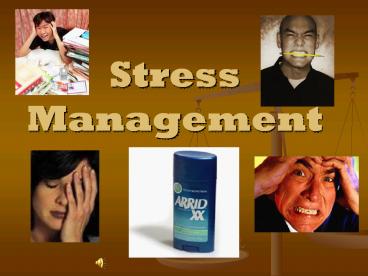Stress Management - PowerPoint PPT Presentation
1 / 17
Title: Stress Management
1
Stress Management
2
Do Now
- Stress Tests
- http//www.lessons4living.com/stress_test.htm
- http//health.discovery.com/centers/stress/assessm
ents/stress_assessment.html
3
What is stress?
- Stress is a condition or feeling experienced when
a person perceives that demands exceed the
personal and social resources the individual is
able to mobilize - a state of mental or emotional strain or suspense
- any experience that taxes an individual's energy
or well-being - Physical, mental, or emotional
4
- Stress- is the bodys and minds reaction to
everyday demands or threats. - Kinds of Stress
- Distress- (or negative stress) on the one hand,
can result when there is too much pressure or
trauma and you dont know how to cope with it. - What are some examples?
- Eustress- (or positive stress) on the other hand,
can help you achieve your goals. - What are some examples?
5
Causes of Stress
"Nothing gives one person so much advantage over
another as to remain always cool and unruffled
under all circumstances."Thomas Jefferson
- Minor frustrations like traffic jams or
arguments. - Arguments
- Relationships
- A major illness or injury to yourself or a family
member. - Death
- Losing a job
- Physical health (lifestyle)
- Smoking/Drugs
- Emotional Concerns
- Unexpressed or uncontrolled anger, depression,
grief, guilt, or low self-esteem - Environment
- Socioeconomic situation
- Life transitions (puberty, college, entering
workforce, etc.)
6
Stressors
- Kinds of Stressors
- Biological Stressors- such as those that come
from biochemical imbalances, mental or physical
illness, disabilities, or injury. - Environmental Stressors- such as poverty,
population, crowding, noise, or natural
disasters. - Cognitive or Thinking Stressors- the way you
perceive a situation or what you expect from it. - Personal Behavior Stressors- those negative
reactions in the body and mind caused by using
tobacco, alcohol, or other drugs, or not
exercising. - Life Situations- having a relative or pet die,
parents who separate or divorce, or trouble in
relationships with peers.
7
The Bodys Stress Response
- When you perceive a situation or event to be a
threat, your body begins a stress response. A
series of events is put into action as your body
prepares itself for DANGER. - Two major systems of the body.
- Nervous System
- Endocrine System
- are active during the bodys response to
stressors.
8
- Alarm- is the first stage in the stress response,
when the body and mind go on high alert. - Resistance- is the second stage in the stress
response, when the body tries to repair its
damage from the stressful event and return to its
normal state. - Fatigue- is the third stage of stress response,
resulting in a tired feeling that lowers ones
level of activity.
9
Stress in Your Life
- Stress and the Brain
- Scientists have determined that in some people,
stress upsets a delicate balance among brain
chemicals called neurotransmitters. - Stress tolerance- is the amount of stress that
you can handle before you reach a state of too
much stress.
10
Stress and the Body-Mind Connection
- There is a clear connection between the health of
the mind and the health of the body. Too much
stress can raise blood pressure, weaken the
immune system, and cause other health risks. It
can even lead to premature, or early death.
- Stress and High Blood Pressure
- Mental and emotional stress can cause an increase
in your levels cholesterol. - When these levels are high, high blood pressure-
a condition that contributes to heart disease and
stroke- can result.
11
Stress and Headache
- When stressed, the muscles in the head and neck
contract. - When the arteries leading to the brain narrow,
blood flow to the brain decreases. When the
arteries open up again, the nerve endings press
into the artery walls, causing severe throbbing,
possibly a loss of balance or coordination, and a
change in mood.
12
Stress and Immune Response
- Prolonged exposure to stress can compromise your
immune response. - Your body cannot fight disease as well as it
might if you had not undergone so much stress.
13
Signs of Stress
- Emotional Signs
- Frustration
- Nervousness
- Boredom
- Edginess
- Feeling powerless
- Being quick to anger
- Impatience
- Mood swings
- Worrying
- Loneliness
- Confusion
- Crying
- Low self-esteem
- Becoming easily upset without cause
- Physical Signs
- Headaches
- trembling or twitching
- upset stomach
- Migraines
- Sweating
- Rash
- Constipation
- Diarrhea
- pounding heart
- muscle aches and tightness
- trouble sleeping
- grinding teeth
- dry mouth
- nervous twitches or tics
- Dizziness
- back pain
- ringing in ears
14
- Behavioral Signs
- Not eating
- Overeating
- Compulsive talking
- Verbal or physical outbursts
- Fidgeting
- Using alcohol
- Caffeine or other drugs
- Smoking
- Gambling
- Tapping feet
- Drumming fingers
- Hurrying
- Forgetting ones values
- Withdrawing
- Reckless and high-risk behaviors like driving too
fast.
- Mental Signs
- Trouble reading or thinking clearly
- Lack of creativity
- Constant worry
- Obsessive thoughts
- Inability to make decisions
- Forgetting
- Losing sense of humor and perspective
15
Ways to Deal with Stress
- Alter lifestyle
- Meditation
- Physical exercise
- Listening to soothing music
- Deep breathing
- Natural and alternative methods
- Personal growth techniques
- Visualization
- Massage
- Communication
16
25 Ways to Reduce Stress
- http//stress.about.com/od/tensiontamers/a/stressr
elievers.htm
17
Written Assignment
- Choose a personal health-related behavior you
would like to change (for example, cigarette
smoking, diet, exercise program, study habits,
alcohol abuse, etc.) Write a two- to three-page
plan for how you will change this behavior. This
well-thought-out plan should set goals,
anticipate problems, and include rewards.
(50 points)































